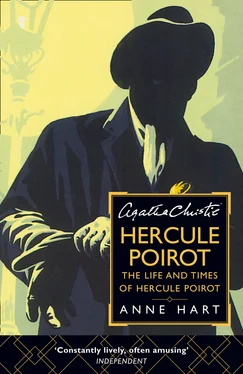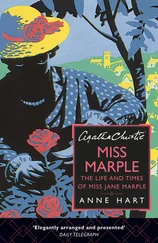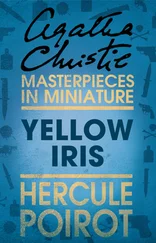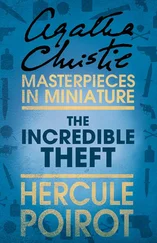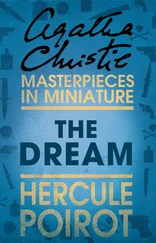Poirot’s next case, Appointment with Death , unfolded in Palestine and Jordan. As it follows on the heels of Death on the Nile , it is fair to assume that both cases occurred on the same eventful holiday, and that Poirot proceeded from the Karnak on the Nile to the Solomon Hotel in Jerusalem and thence to Amman. With him he brought a letter of introduction from Colonel Race to Colonel Carbury, an administrative ‘power’ in Transjordania. Raising his eyes from Race’s letter, Colonel Carbury, a devotee of detective fiction, smiled hopefully upon his guest:
‘Tell me, d’you ever find your own special job has a way of following you around?’
‘ Pardon ?’
‘Well – to put it plainly – do you come to places expecting a holiday from crime – and find instead bodies cropping up?’
‘It has happened, yes – more than once.’
‘H’m,’ said Colonel Carbury, and looked particularly abstracted.
Then he roused himself with a jerk.
‘Got a body now I’m not very happy about,’ he said.
The body was that of an American tourist, the autocratic Mrs Boynton – ‘a distorted old Buddha – a gross spider in the centre of a web!’ – whose life had been universally pronounced as ruinous to all around her, and whose sudden death, while surrounded by her family in a tourist encampment at Petra, now raised a most disagreeable question: had someone slain the dragon?
In the course of his investigations Poirot enjoyed fulfilling Colonel Carbury’s every expectation of how a detective should behave:
‘You desire to know, do you not, Colonel Carbury, who killed Mrs Boynton ? (That is, if she was killed and did not die a natural death.) Exactly how and when she was killed – and, in fact, the whole truth of the matter?’
‘I should like to know that, yes.’ Carbury spoke unemotionally.
Hercule Poirot said slowly:
‘I see no reason why you should not know it!’
And promising a solution within twenty-four hours, Poirot commenced to unravel the tangled web at Petra, thereby encountering a ménage of tourists who, when their minds were not on Mrs Boynton’s death, tended to discuss questions of the day: the League of Nations, the enmity of the Arabs toward the Jews, the menace of white slavers and drug dealers, and the benefits or otherwise of psychotherapy.
But Colonel Carbury was only concerned with the whodunit writing itself before his very eyes:
‘I suppose you couldn’t do the things the detective does in books? Write a list of significant facts – things that don’t seem to mean anything but are really frightfully important – that sort of thing?’
‘Ah,’ said Poirot kindly. ‘You like that kind of detective story? But certainly, I will do it for you with pleasure.’
He drew a sheet of paper towards him and wrote quickly and neatly: SIGNIFICANT POINTS.
In one respect Hercule Poirot’s Christmas , 19 published in 1938, is reminiscent of ‘The Adventure of the Christmas Pudding’ of the early 1920s – the outset of each case finds Poirot ill at ease with country Christmas cheer and gazing gloomily upon a blazing Yuletide fire. In ‘The Adventure of the Christmas Pudding’ he had been in mourning for a Hastings departed to the Argentine. In Hercule Poirot’s Christmas , in the home of Colonel Johnson, the Chief Constable of Middleshire and a friend from the Three Act Tragedy case, his secret lamentations were all for his neck. In the absence of central heating it was, he felt sure, dreadfully at risk from cold draughts.
Inevitably, an alarming distraction soon came to hand. ‘Damn it all!’ cried the Chief Constable. ‘Case of murder! On Christmas Eve too!’ This led to Poirot’s posthumous introduction to a neighbouring millionaire, the tyrannical Simon Lee, whose neck – cut neatly through the jugular vein – had suffered a far greater misfortune than Poirot’s that Christmas Eve.
The surviving members of the Lee family, as described by Colonel Johnson, were of a mode familiar to Poirot from many an earlier case:
‘All the same, it’s incredible, you know. Here’s a particularly crude and brutal murder – and whom have we as suspects? Alfred Lee and his wife – both charming, well-bred, quiet people. George Lee, who’s a member of parliament and the essence of respectability. His wife? She’s just an ordinary modem lovely. David Lee seems a gentle creature and we’ve got his brother Harry’s word for it that he can’t stand the sight of blood. His wife seems a nice, sensible woman – quite commonplace. Remains the Spanish niece and the man from South Africa.’
Well, there they all were. As Poirot commented, as he set to work, on Christmas Eve there is apt to be ‘a great amount of strain ’ in families.
Two cases of this busy period, described in the short stories ‘Yellow Iris’ and ‘The Dream’, took place in London and mercifully required no more than the summoning of taxis to bring Poirot to the scenes of impending crimes.
Nevertheless, the affair of the ‘Yellow Iris’ did tear him away, on a chilly night, from the contemplation of his beloved electric radiator to the far less certain pleasures of a champagne supper at a fashionable restaurant. Here – according to an anonymous phonecall – someone at a table decorated with yellow irises was in danger of being murdered. Dutifully insinuating himself into this lively scene, Poirot encountered hazards of his own. Seated beside a well-known South American dancer, he murmured:
‘Señora, as the evening advances I become more brave. If you would dance with me now –’
‘Oh, yes, indeed. You are – you are ze cat’s whiskers, M. Poirot. I inseest on dancing with you.’
‘You are too kind, Señora.’
Altogether it turned out to be a tense evening. So quickly and cleverly did Poirot foil a murderer, however, that his amour propre returned in a rush:
‘Señora, as the evening advances I become more brave. If you would dance with me now – ‘
‘Oh, yes, indeed. You are – you are ze cat’s whiskers, M. Poirot. I inseest on dancing with you.’
‘You are too kind, Señora.’
Poirot found events in ‘The Dream’ far less exciting. In this case a summons for help took him to the somewhat déclassé mansion of a reclusive millionaire, Benedict Farley, a man constantly tormented by a dream that at exactly twenty-eight minutes past three he will shoot himself. Poirot firmly declined the case (‘For that, Monsieur Farley, I should recommend Napoleon’s Book of Dreams – or the latest practising psychologist from Harley Street’), but within a week Farley’s dream had come true, and Poirot was summoned again. Gathered together were Farley’s widow, his daughter, his secretary, his doctor and a police inspector. Poirot heard out their stories, sat back, and inquired:
‘One more question, Mrs Farley. Had your husband good sight?’
‘No. Not without his glasses.’
‘He was very short-sighted?’
‘Oh, yes, he was quite helpless without his spectacles.’
‘He had several pairs of glasses?’
‘Yes.’
‘Ah,’ said Poirot. He leaned back. ‘I think that that concludes the case …’
There was silence in the room. They were looking at the little man who sat there complacently stroking his moustache.
It is clear from a number of contemporary references that Poirot’s next investigation, One, Two, Buckle My Shoe , 20 published in 1940, takes place in the first half of the catastrophic year of 1939. Hints of dangers in Europe – Communists and Fascists, arms dealers and assassins, spies and counter-spies – surface like piranha throughout this complex affair. As for England, there is much talk of preserving a solvent economy and conservative values at all costs, the Prime Minister is shot at, and the Imperial Shirts ‘march with banners and have a ridiculous salute’.
Читать дальше
